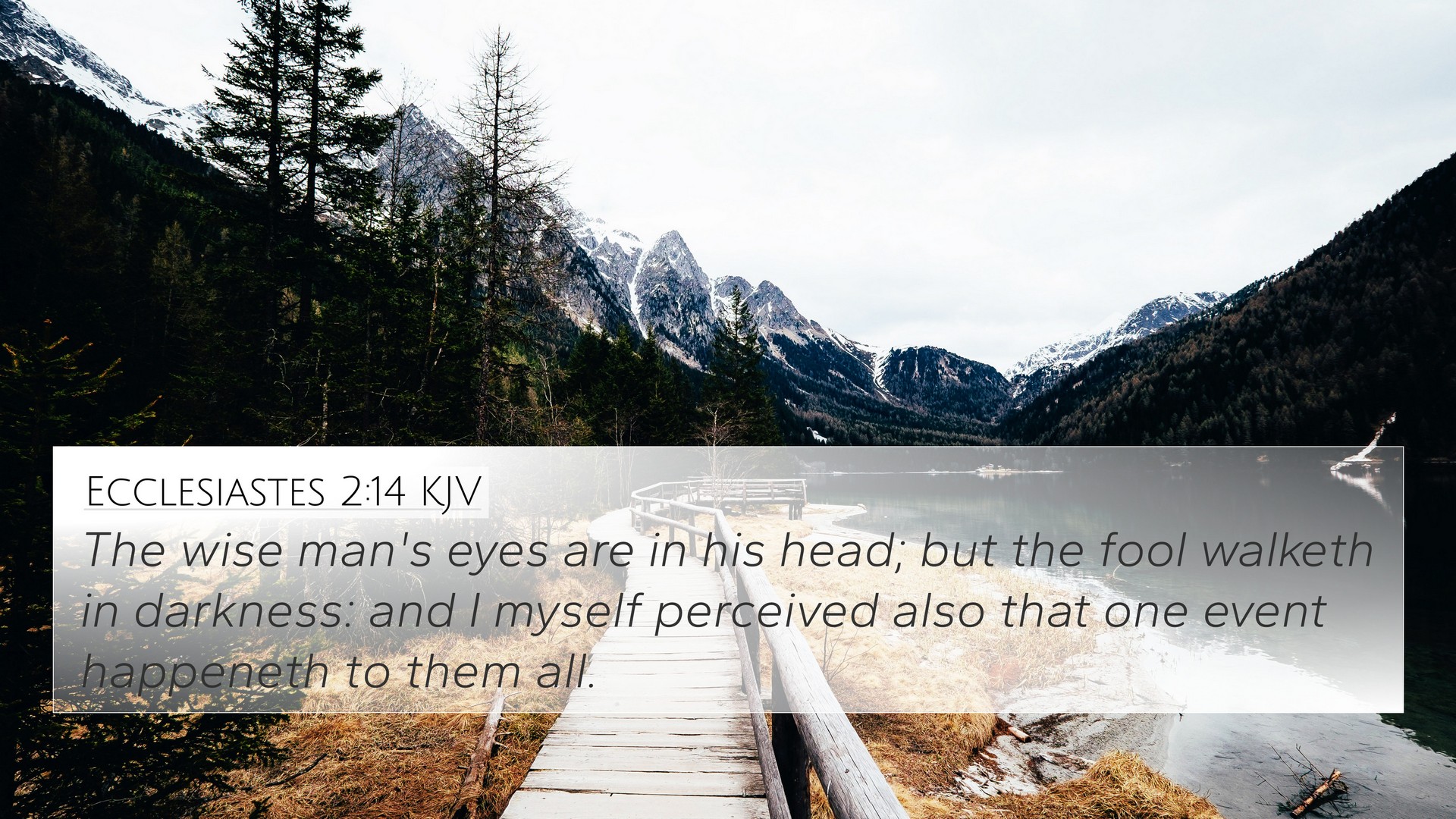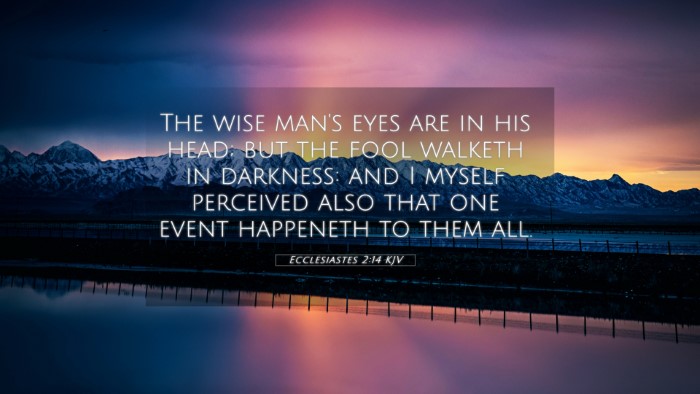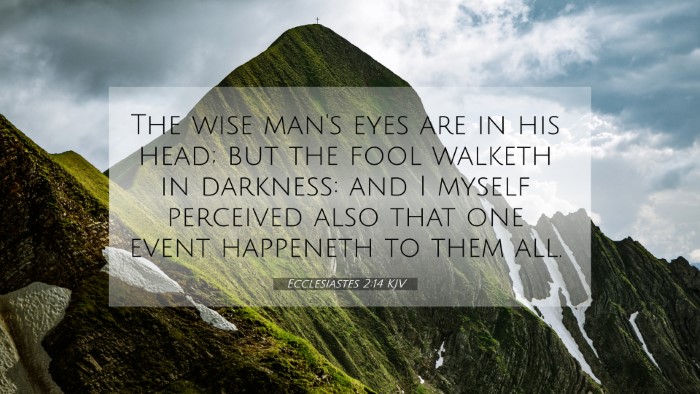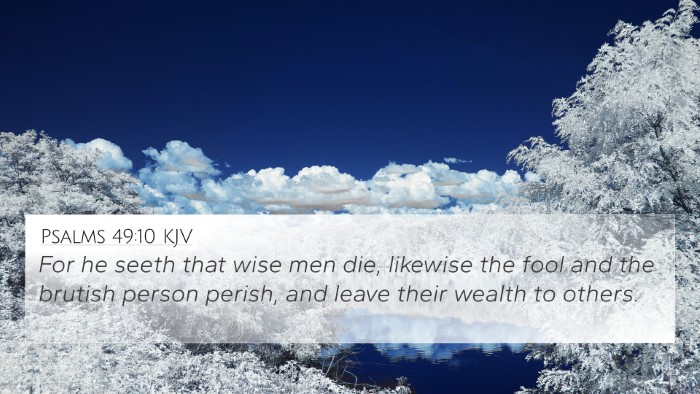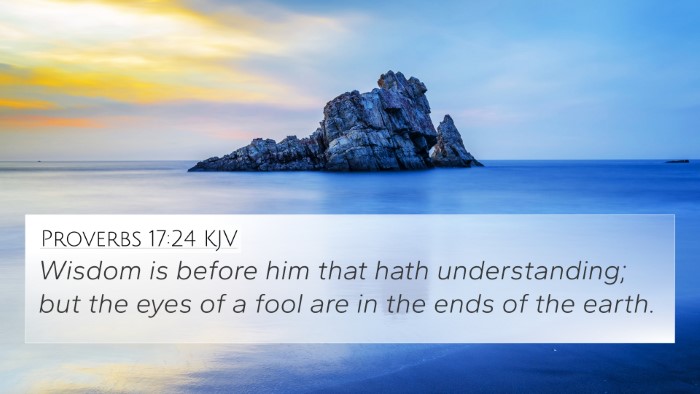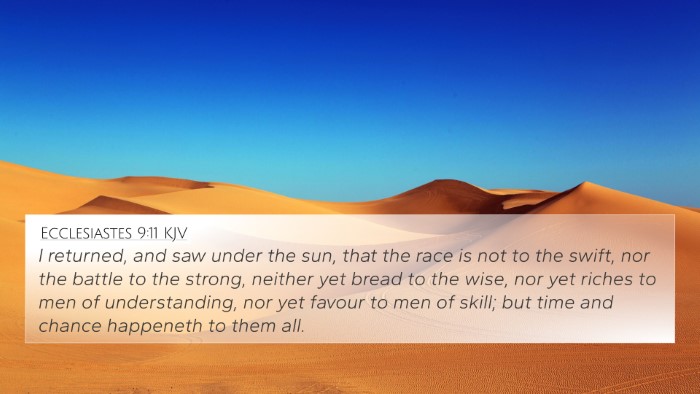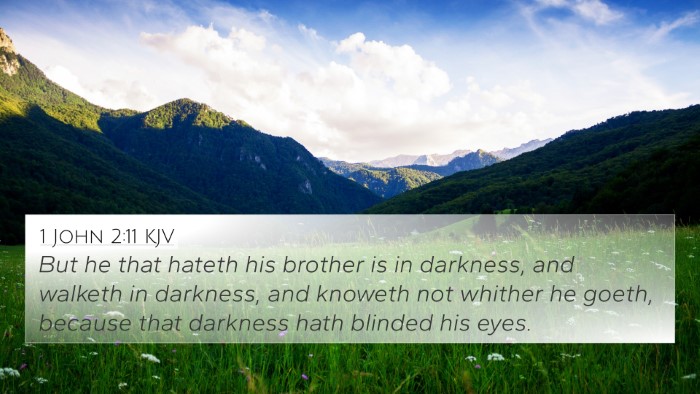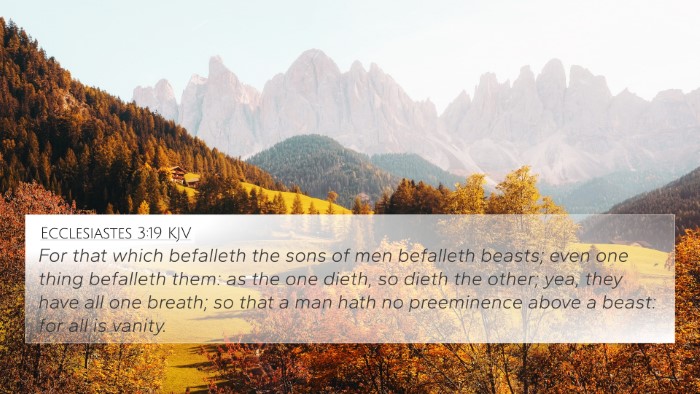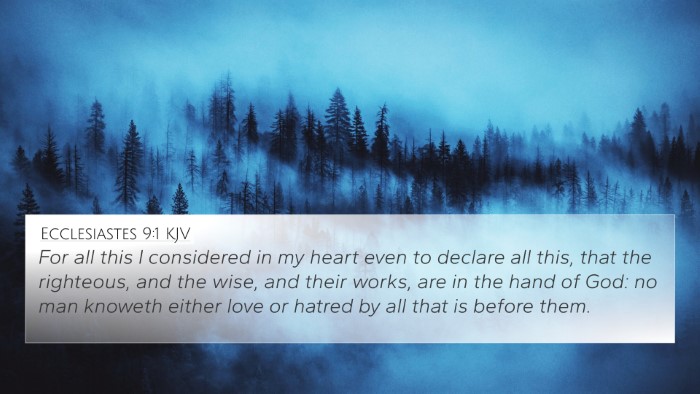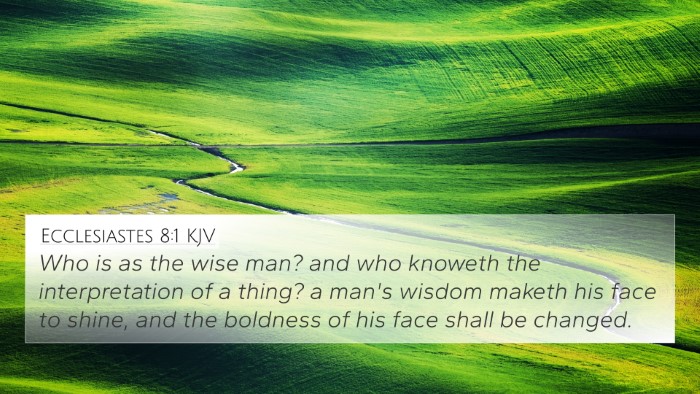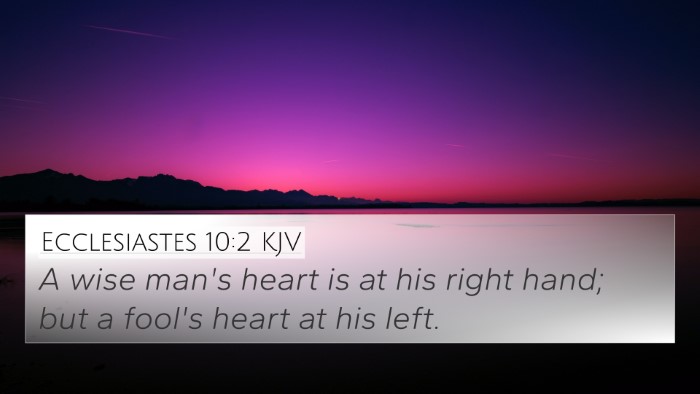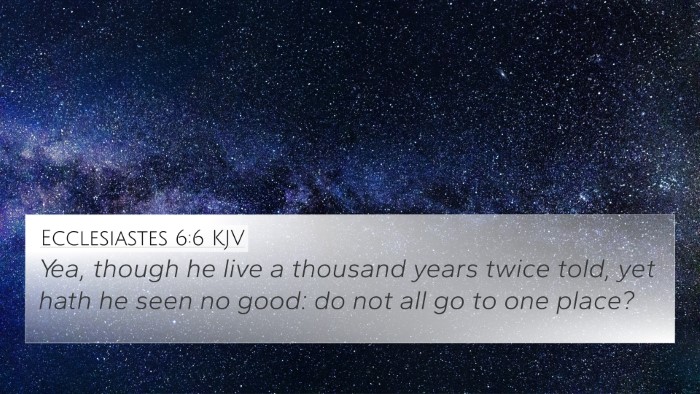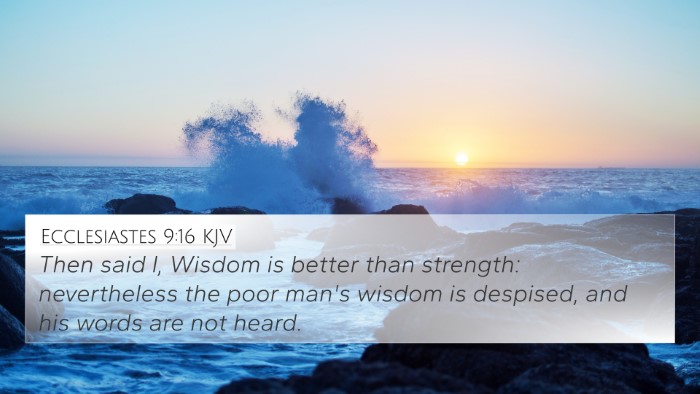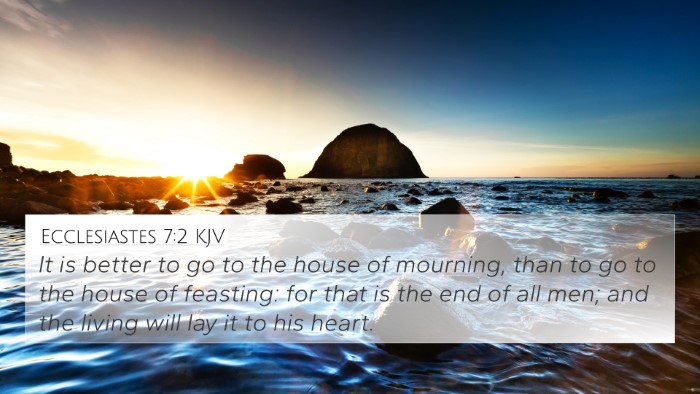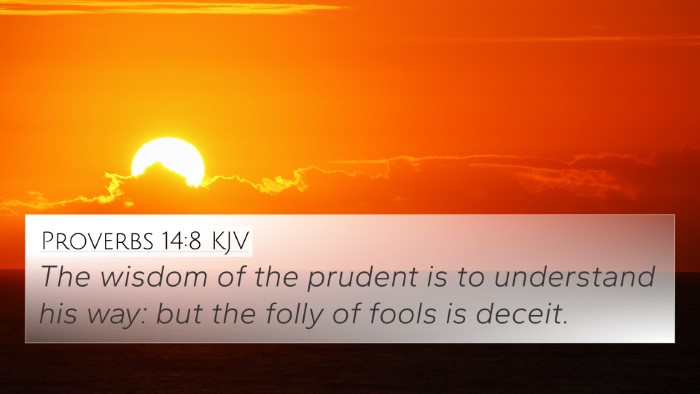Understanding Ecclesiastes 2:14
Verse: "The wise man's eyes are in his head; but the fool walketh in darkness: and I myself perceived also that one event happeneth to them all." (Ecclesiastes 2:14 KJV)
Summary of Meaning
In Ecclesiastes 2:14, the author, traditionally believed to be King Solomon, reflects on the nature of wisdom and folly. This verse contrasts the wise and the foolish, emphasizing the advantages of wisdom while acknowledging the common fate that befalls all people, regardless of their wisdom or ignorance. This passage encourages readers to seek understanding and discernment as life’s unpredictability affects everyone equally.
Insights from Commentaries
Matthew Henry
Matthew Henry points out that the wise man has a clearer vision, depicted as having "eyes in his head," symbolizing clarity and insight into the ways of life. The wise navigate through life with understanding, while the fool walks in darkness, representing ignorance and a lack of insight. Importantly, Henry notes that wisdom does not exempt one from life's hardships, as "one event happeneth to them all" signifies the universality of death and the futility of worldly pursuits.
Albert Barnes
Albert Barnes emphasizes the idea that wise individuals gain an awareness of their surroundings and the inevitability of fate. The contrast between the wise man and the fool illustrates that wisdom grants perspective on both life and death, allowing the wise to prepare for the inevitable. Barnes also discusses the existential theme of Ecclesiastes, where the teacher reflects on the vanity of life, urging readers to recognize that ultimately, all humans face the same destiny, regardless of their intellectual or moral standing.
Adam Clarke
Adam Clarke interprets this verse as an illustration of the importance of wisdom over foolishness in making life choices. He reiterates that the wise man, endowed with knowledge, can navigate the complexities of life, while the fool lacks such discernment, leading to a life lived in darkness. Clarke further comments on the shared fate of all humanity, suggesting that temporal wisdom and achievements will not change the ultimate destiny that awaits everyone, thus reinforcing the theme of vanity found throughout Ecclesiastes.
Cross References
- Ecclesiastes 9:2: "All things come alike to all: there is one event to the righteous, and to the wicked."
- Proverbs 4:7: "Wisdom is the principal thing; therefore get wisdom: and with all thy getting get understanding."
- Job 28:20-28: Discusses the pursuit and value of wisdom.
- Psalms 49:10-12: "For he seeth that wise men die, likewise the fool and the brutish person perish, and leave their wealth to others."
- 1 Corinthians 1:19-25: Discusses how the wisdom of the world is foolishness with God.
- Luke 12:20: "But God said unto him, Thou fool, this night thy soul shall be required of thee."
- Ecclesiastes 3:19: "For that which befalleth the sons of men befalleth beasts; even one thing befalleth them: as the one dieth, so dieth the other."
Application and Reflection
This verse invites readers to engage in comparative Bible verse analysis to deepen their understanding of the nature of wisdom and the human condition. It serves as a reminder to value wisdom, strive for understanding, and recognize the transient nature of life. As a part of your Bible study tools, consider utilizing a Bible cross-reference guide to explore the connections between Ecclesiastes 2:14 and other related scriptures.
Thematic Connections
The themes present in Ecclesiastes 2:14 echo throughout the Scriptures, offering rich insights into human experience:
- Wisdom vs. Foolishness: This is a prominent theme found in various Bible verses that relate to each other, including Proverbs and Job, emphasizing the value of wisdom that leads to life.
- Uniqueness of Human Experience: The verse touches on the shared fate of all humanity, a recurring theme seen in many linking Bible scriptures.
- Existential Reflection: The dialogue on life’s meaning and the futility of labor forms a critical narrative throughout Ecclesiastes, echoing the sentiments found in Paul’s letters.
Conclusion
In conclusion, Ecclesiastes 2:14 profoundly encapsulates the wisdom literature’s core themes: discernment in life and the inescapable fate awaiting all, spurring readers to reflect deeply on their life choices in the face of life’s uncertainties. Utilize comprehensive Bible cross-reference materials to explore the multifaceted connections within Scripture and deepen your understanding of these significant biblical themes.
